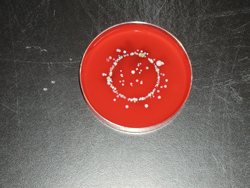 |
Agar plate culture of a stethoscope (obtained by lightly pressing the diaphragm of the scope against the plate) shows the potential for stethoscopes to carry germs. |
Beginning this month, each individual patient at the hospital will be provided his or her own high quality stethoscope to eliminate the potential for patient-to-patient spread of bacteria carried on stethoscopes.
“Numerous studies have shown that health care workers rarely clean their stethoscopes between patients,” said Mark Rupp, M.D., an infectious disease specialist at UNMC and The Nebraska Medical Center. “There are many reasons for the non-compliant behavior. Sometimes workers get too busy or are too distracted. Other workers may not realize the importance of cleaning the stethoscope after every use.”
According to the Annals of Emergency Medicine, stethoscopes can carry disease from one patient to another, spreading everything from the common cold and flu to life-threatening multi-drug resistant pathogens such as methicillin-resistant Staphylococcus aureus (MRSA).
The Centers for Disease Control and Prevention (CDC) report that more than 100,000 people die from hospital infection each year and that 5 percent of patients in the United States acquire an infection while in the hospital.
|
|
“The Nebraska Medical Center has not noted any problems with unsanitary stethoscopes spreading diseases to patients, but this would be very difficult to conclusively define,” Dr. Rupp said. “However, the published results show that somewhere between 30 to 100 percent of stethoscopes culture positive for organizisms including MRSA and enterococcus. The medical center is taking this preventative measure to provide a safe environment for our patients.”
Each patient room at The Nebraska Medical Center is now stocked with a high quality Littmann stethoscope available for patient examination.
The stethoscopes are easily recognizable to health care workers as the tubing is a distinctive lilac color. In semi-private rooms, there will be two stethoscopes provided. A process for routine cleaning of these stethoscopes after patient discharge also has been developed.
The manufacturer of the Littmann stethoscopes, 3M Corporation, provided support for this project.
The Nebraska Medical Center is not aware of any other hospitals in the Omaha metro that have taken this proactive step.